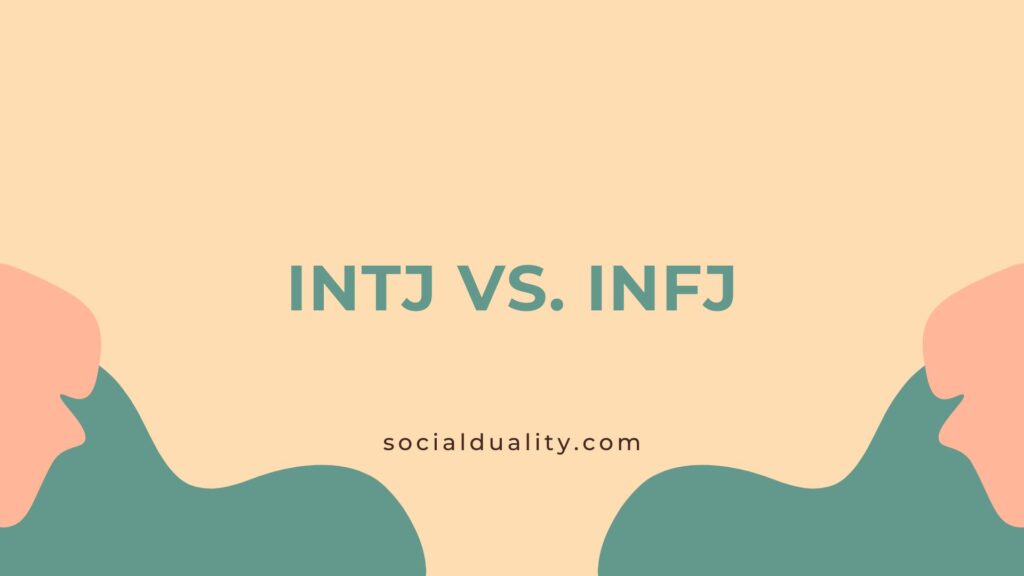INTJs and INFJs are two unique personality types. They have similar personalities but differ in key ways. Both use Introverted Intuition, guiding their thoughts and actions. However, their second and third functions are very different.
INFJs feel deeply and tend to focus on emotions. They care about harmony in relationships. INTJs, on the other hand, prefer logic. They often ignore feelings unless they offer clear benefits.
In social settings, INFJs are warm and friendly. They value connection with others. INTJs are more direct, like a friendly neighborhood INTJ. They get straight to the point.
Both personality types thrive in different environments. Understanding these patterns helps in identifying if you are an INTJ or INFJ.
Key Takeaways
- INTJs focus on logic and efficiency, often ignoring emotions.
- INFJs value emotional harmony and are empathetic in social settings.
- INTJs are direct and business-like, while INFJs are warm and friendly.
- INFJs approach tasks holistically, connecting different parts to their vision.
- INTJs are methodical, focusing on clear, efficient goals.
Cognitive Functions: INFJ vs. INTJ
Examining how INFJs and INTJs organize their thoughts reveals intriguing contrasts. While both share Ni and Se as dominant and inferior functions, their secondary functions diverge. INFJs typically harness Fe and Ti, leading to a more emotionally attuned outlook. In contrast, INTJs often wield Te and Fi, focusing on logical analysis and efficiency.
This contrast in cognitive functions extends to how they feel and engage with the world. INFJs often embrace emotional expression, while INTJs may come across as more reserved. This difference can impact how these personality types thrive in social interactions. INFJs lean towards empathy and warmth, whereas INTJs might be perceived as direct or even blunt.
When it comes to processing information, INFJs tend to focus on the big picture. They interconnect ideas and concepts, aligning them with their personal vision. INTJs, by comparison, are more analytical and systematic. They break tasks into manageable parts, aiming for a logical conclusion.
Debate styles further highlight these differences. INFJs typically prefer private discussions, especially on sensitive topics. They shy away from conflicts, choosing instead to engage in safe environments. INTJs, however, often relish open debates. They enjoy testing ideas and are not easily offended by opposing views.
Here’s a quick list to summarize the key INTJ and INFJ differences:
- INFJs are emotionally attuned, while INTJs are more logical.
- INFJs express feelings openly; INTJs are more reserved.
- INFJs prefer holistic approaches; INTJs are systematic.
- INFJs lean towards empathy; INTJs are more direct.
- INFJs avoid conflict; INTJs embrace debate.
- INFJs often engage privately; INTJs favor open discussions.
- Both are unique personality types with their own strengths.

Decision-Makers: Emotional vs. Rational
When it comes to how decisions are made, INFJs and INTJs showcase distinct approaches. INFJs infuse emotional insight into their choices, valuing harmony and personal connections. They might ponder how decisions will make others feel, aligning actions with personal values.
In contrast, INTJs favor a more logical path, prioritizing efficiency and practicality. They seldom let emotions steer the wheel unless they serve a functional purpose. This might feel a bit robotic to some, but hey, it’s their way!
The INTJ personality type often thrives in environments where clear, rational decisions are key. They are like the friendly neighborhood INTJ, ready to tackle problems with a cool head. INFJs, meanwhile, tend to dwell in the realm of feelings and social harmony, making them adept in situations requiring emotional intelligence.
Comparing INFJ and INTJ types isn’t just about decision-making. It’s about how they perceive the world. INFJs might ask, “How will this choice impact the group’s feeling?” INTJs might counter with, “What’s the most efficient solution?”
Such differences in personality types make for a fascinating study in human nature. They offer insights into why some people might seem like oil and water. Yet, both types share a common goal: finding the best solution.
For a deeper dive into personality patterns INFJ types, one might find insights at Introvert, Dear’s INFJ guide. This source explores the nuances of the INFJ experience.
| Aspect | INFJ | INTJ |
|---|---|---|
| Decision Focus | Emotional Harmony | Logical Efficiency |
| Cognitive Functions | Fe, Ti (Feeling, Thinking) | Te, Fi (Thinking, Feeling) |
| Social Approach | Warm, Empathetic | Direct, Business-like |
| Emotional Processing | Open with Feelings | Reserved, Private |
| Debate Style | Prefers Private Discussions | Thrives on Open Debate |
Both intj or infj have their unique strengths, showcasing how similar personalities can diverge in fascinating ways.
Social Interactions: Warmth vs. Business-like
Exploring the dynamics of social interactions between INFJ and INTJ personalities reveals distinct styles: one exuding warmth, the other more business-like. While both personality types bring unique elements to the table, their approach to social settings sets them apart.
- Feel of Interaction: INFJs often make others feel valued and understood. Their empathetic nature is almost like a comforting hug in social gatherings. In contrast, the INTJ personality type tends to prioritize efficiency. This directness can sometimes make interactions feel more like a brisk handshake.
- Conversation Style: INFJs tend to engage in heartfelt dialogues. They love diving deep into personal stories and emotions. An INTJ, however, prefers sticking to facts, often leading discussions with a clear purpose in mind.
- Emotional Awareness: INFJs can easily sense how others feel. This emotional radar helps them navigate complex social waters with ease. Meanwhile, INTJs might miss subtle emotional cues, focusing more on logical outcomes.
- Feedback Reception: INFJs are sensitive to feedback and may take criticism to heart. They feel deeply and sometimes wear their heart on their sleeve. INTJs, on the other hand, view feedback as a tool for improvement, less swayed by emotions.
- Social Energy: INFJs often feel rejuvenated by meaningful conversations. They thrive on emotional exchanges, drawing energy from others. INTJs might find prolonged social engagements draining and prefer brief, purposeful interactions.
- Conflict Handling: INFJs aim to resolve conflicts by fostering understanding, often avoiding direct confrontation. In contrast, INTJs tackle disputes head-on, focusing on finding strategic solutions over emotional resolutions.
- Group Dynamics: INFJs excel in creating harmonious group environments. They feel more fulfilled when others in the group are content. INTJs, however, might prioritize task completion and efficiency, even if it means stepping on some toes.
Understanding these differences can enhance interactions with both INFJ and INTJ individuals, ensuring each feels respected and understood.
Approaching Work: Holistic vs. Methodical
Finding the right path in how they approach tasks, INFJs and INTJs often diverge significantly. INFJs tend to view projects as interconnected wholes, driven by their intuition and what they feel emotionally connected to. They love weaving different elements together to create a tapestry that aligns with their vision. In contrast, the INTJ personality type prefers a systematic approach. They break tasks into smaller sections, often tackling them step-by-step with precision.
When comparing these personality types, one might think of a painter versus an architect. The INFJ paints with broad strokes, seeing the big picture, while the INTJ lays out detailed blueprints to achieve a specific goal. Their methods reflect their cognitive functions, where INFJs draw from their Fe to feel the emotional significance of their tasks, while INTJs use their Te to prioritize logical structure.
In joint projects, this can create interesting dynamics. INFJs might feel overwhelmed by too many rigid rules and need freedom to connect ideas. INTJs might feel frustrated with the lack of order and ways to measure progress. This distinction shows the classic INFJ vs INTJ cognitive functions at play.
Understanding whether one is an INTJ or INFJ can help in leveraging these strengths. Each personality type brings unique gifts to a team. When working together, they can complement each other beautifully—if they recognize and respect their different approaches.
| Aspect | INFJ Approach | INTJ Approach | Key Difference |
|---|---|---|---|
| Task View | Holistic | Methodical | Big picture vs. step-by-step |
| Emotional Influence | High | Low | Feelings vs. logic |
| Project Management | Flexible | Structured | Adaptability vs. precision |
| Focus | Visionary | Goal-Oriented | Vision vs. efficiency |
| Cognitive Functions | Ni-Fe | Ni-Te | Emotion vs. logic |

Emotional Expression: Open vs. Reserved
When contrasting how INFJ and INTJ types express emotions, the differences can be quite stark. INFJs are like open books when they feel safe. They express emotions freely and use this openness to connect with others. INFJs feel deeply, and you can often see it in their eyes. They use emotional expression as a bridge, helping them navigate complex social situations.
INTJ personality type individuals, however, are more reserved with their feelings. They might seem like a closed book, choosing to keep their emotional world under wraps. For them, sharing feelings is like handing over a piece of their soul, something done with caution. They prefer to process emotions internally, and when they do share, it’s with someone they trust implicitly.
Comparing INFJ and INTJ types in this way highlights their cognitive functions. INFJs’ use of Fe makes them more emotionally expressive, while INTJs’ Fi keeps emotions tucked away. This difference doesn’t mean one is better than the other; it’s simply how their unique personalities operate.
Both personality types, however, have their own ways of dealing with feelings. Here’s a quick rundown:
- INFJs express emotions easily in trusted settings.
- INTJs are cautious with emotional expression.
- INFJs use emotions to build social connections.
- INTJs prefer internal emotional processing.
- INFJs’ openness helps them feel relatable.
- INTJs’ reserved nature can seem detached.
- Both types value trust when sharing emotions.
- Emotional expression is a tool for INFJs, whereas INTJs see it as a rare gift.
The dance of open versus reserved emotional expression is a fascinating aspect of these personality types. Such nuances can enrich our understanding of human interactions.
Debate Styles: Private Opinions vs. Open Debate
The balance between private opinions and open discussions reveals much about INFJ vs INTJ cognitive functions. Those with these personality types often approach debates differently. INFJs, valuing harmony, often keep thoughts to themselves in contentious situations. This approach is like playing hide and seek, where they carefully pick when to reveal their thoughts. It helps them avoid conflict and maintain peace.
INTJs, however, dive into debates head-on. They treat discussions like a chess game, relishing in the strategy and exchange of ideas. For them, it’s less about feelings and more about testing logic. This creates an environment where they feel they can discuss openly without being personally hurt.
Interestingly, both personality types handle criticism uniquely. INFJs might take things more to heart, as they are sensitive to the emotional atmosphere. They need time to digest feedback and feel it through. They crave supportive settings to express their views.
INTJs handle criticism like a puzzle piece, looking to fit it into their broader understanding. They use it to sharpen their thinking, not as a personal attack. Their focus is on the big picture, and how the feedback can help them improve.
In this dynamic, INFJs might see debates as an emotional journey, while INTJs view them as logical exercises. This difference in approach highlights the unique ways these personality types feel and think. While INFJs strive for empathy, INTJs pursue clarity.
Both approaches have value, offering different insights into human interaction. Whether through the calm waters of INFJs or the spirited discussions of INTJs, understanding these styles enriches our appreciation for how personality types feel their way through life.
Conclusion
INTJs and INFJs, while similar in some ways, have distinct differences. These differences can be seen in their decision-making and social interactions. INFJs often prioritize emotions and harmony. They aim for solutions that make everyone feel good. This makes them warm and approachable. On the flip side, INTJs lean towards logic and efficiency. They approach situations with a business-like demeanor. This can sometimes come off as blunt.
In the workplace, INFJs focus on the big picture. They connect pieces to align with their vision. INTJs, however, break tasks into manageable chunks, making sure everything is done efficiently. When it comes to emotions, INFJs are more open and expressive. They share their feelings to connect with others. INTJs, though, keep emotions close, sharing them with a select few.
How do cognitive functions differ between INTJs and INFJs?
INTJs and INFJs both rely on Introverted Intuition (Ni) but differ in their other functions. INFJs use Extraverted Feeling (Fe) and Introverted Thinking (Ti). This makes them more tuned into emotions and social harmony. INTJs use Extraverted Thinking (Te) and Introverted Feeling (Fi). They focus on logic and efficiency, often setting aside emotions.
How do INTJs and INFJs make decisions?
INFJs lean on emotions when making decisions. They aim for harmony and meeting personal needs. INTJs focus on logic and efficiency, often ignoring emotions unless they are useful. They make decisions based on what works best, not how it feels.
How do social interactions differ between INTJs and INFJs?
INFJs come across as warm and approachable. They care about others’ feelings and are good at empathy. INTJs are more business-like. They say what they mean and get straight to the point. This can sometimes seem blunt or insensitive.
How do INTJs and INFJs approach their tasks at hand?
INFJs approach tasks holistically with intuition and emotion. They connect different parts of a project to fit their vision. INTJs are methodical, breaking tasks into steps. They focus on achieving goals efficiently, like following a map.
How do INTJs and INFJs express their emotions?
INFJs are open about their emotions, especially in safe settings. They use emotional expression to connect with others. INTJs are reserved with their emotions. They prefer to process them privately and share them rarely, usually with trust.


